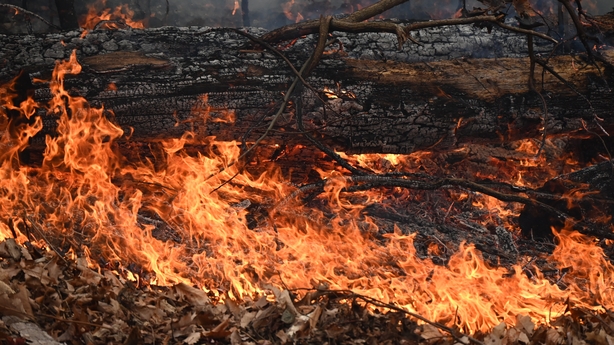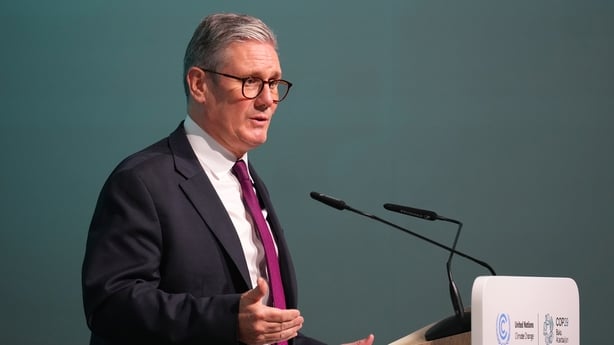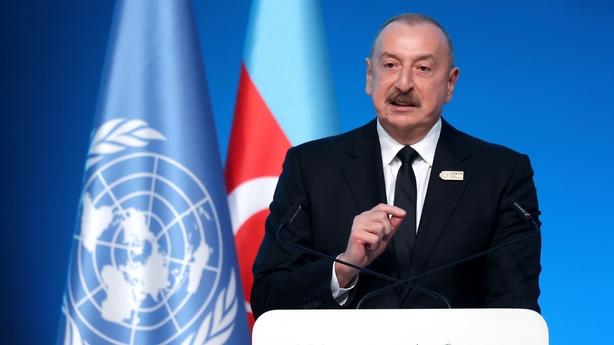United Nations Secretary-General Antonio Guterres has told world leaders at the COP29 summit to "pay up" to prevent climate-led humanitarian disasters, and said time was running out to limit a destructive rise in global temperatures.
Nearly 200 nations have gathered at the annual UN climate summit in Baku, focused this year on raising hundreds of billions of dollars to fund a global transition to cleaner energy sources and limit the climate damage caused by carbon emissions.
But on the day of the summit designed to bring together world leaders and generate political momentum for the marathon negotiations, many of the leading players were not present to hear Mr Guterres' message.
After victory for Donald Trump, a climate change denier, in the US presidential election, President Joe Biden will not attend. Chinese President Xi Jinping has sent a deputy and European Commission President Ursula von der Leyen is not attending because of political developments in Brussels.
"On climate finance, the world must pay up, or humanity will pay the price," Mr Guterres said in a speech.
"The sound you hear is the ticking clock. We are in the final countdown to limit global temperature rise to 1.5 degrees Celsius and time is not on our side."
This year is set to be the hottest on record.
Scientists say evidence shows global warming and its impacts are unfolding faster than expected and the world may already have hit 1.5 degree Celsius of warming above the average pre-industrial temperature - a critical threshold beyond which it is at risk of irreversible and extreme climate change.
As COP29 began, unusual east coast US wildfires that triggered air quality warnings for New York continued to grow.
In Spain, survivors are coming to terms with the worst floods in the country's modern history and the Spanish government has announced billions of euros for reconstruction.

'Economy killer'
The summit opened yesterday with a technical deal seen as critical to launching a UN-backed global carbon market that would fund billions of dollars of projects that reduce greenhouse gas emissions.
That success was marred by a row over the summit priorities - a procedural tug-of-war that pitched European and small island countries against the Arab group of nations on how prominent the future of fossil fuels should be on the agenda.
The opening procedures were delayed by at least five hours, ending in an eventual compromise reluctantly accepted by the EU and other aligned nations.
At a press conference, COP29 officials sought to refocus attention on the summit's primary goal - agreeing a deal for up to $1 trillion in annual climate finance for developing countries.
"Enabling every country to take strong climate action is 100% in all countries' interests, even the largest and wealthiest. Why? Because the climate crisis is fast becoming an economy killer," said Simon Stiell, head of the UNFCCC climate body that facilitates the summit.
"Unless all countries can slash emissions deeply, every country and every household will be hammered even harder than they currently are. We'll be living in a permanent inflationary nightmare."
UK vows to cut greenhouse gas emissions by 81% by 2035
At the summit, British Prime Minister Keir Starmer announced that the UK will aim to reduce greenhouse gas emissions by 81% on 1990 levels by 2035.
The previous government committed in 2021 to curb such emissions by 78% over the same period compared to 1990.
Mr Starmer said Britain was "building on our reputation as a climate leader" and that it has "a critical role to play".
"I've had a series of meetings here at COP this week because this government recognises that the world stands at a critical juncture in the climate crisis," he added.
"There is no national security, there is no economic security, there is no global security without climate security."

Mr Starmer insisted that his government was not going to "start telling people how to live their lives" in order to meet the new emissions reduction target.
"We're not going to start dictating to people what they do," he added.
He touted efforts already put in place by ministers to meet what he called an "ambitious" but "realisable target", including ending an effective ban on new onshore wind projects.
His Labour government has also said it will not issue any new oil and gas exploration licenses in the North Sea, and closed the UK's last coal power plant in September.
Mr Starmer said that meant Britain was the "first G7 economy to phase out coal power", and that it was now prioritising renewable energy projects.
Oil is a 'gift of god' says host of COP29 climate talks
Azerbaijan's president, whose country is hosting the COP29 climate talks, repeated his insistence that oil, gas and other natural resources are a "gift of the God".
In a robust defence of his country against what he termed "fake news" and a "well-coordinated campaign of slander and blackmail," Ilham Aliyev said nations should not be judged by their natural resources and how they use them.
"Quote me that I said that this is a gift of the God, and I want to repeat it today here at this audience," he told delegates at the climate conference in Baku.
"Oil, gas, wind, sun, gold, silver, copper, all... are natural resources and countries should not be blamed for having them and should not be blamed for bringing these resources to the market, because the market needs them.
"People need them."

Azerbaijan has seven billion barrels of proven oil reserves and was one of the first places in the world to start commercial oil production.
Since gaining independence from the Soviet Union in 1991, Azerbaijan has produced 1.05b tonnes of oil and is set to increase its natural gas production by more than a third in the next decade.
Revenues from oil and gas production make up about 35% of the country's GDP and nearly half of the state budget.
About 75% of Azerbaijan's energy exports go to European markets.
In 2022, the European Commission signed a deal with Baku to double gas imports from the country, keen to reduce Europe's dependence on Russian gas - an agreement Mr Aliyev defended in his speech.
"It was not our idea," he said.
"They asked us to help, and we said okay, we will help Europe with energy security."
Poorer countries must not leave summit 'empty handed' - UN chief
Mr Guterres said that nations at the COP29 summit must reach a deal that does not leave poorer countries "empty-handed" in their fight against climate change.
"Developing countries must not leave Baku empty-handed. A deal is a must," he said.
The Azerbaijani COP29 Presidency claimed a breakthrough late yesterday after a consensus was reached about standards for the creation of carbon credits.
The idea behind carbon credits market is that countries who fail to cut greenhouse gas emissions sufficiently could, for example, pay another country or other body to protect endangered forestry or grow new forests that would suck carbon out of the atmosphere on their behalf.
The COP29 presidency said setting the standards for what can legitimately be bought and sold for this purpose will enable climate action by increasing demand for carbon credits and ensuring that the international carbon market could operates with integrity.
Read more: Standards for Carbon Credits at COP29 and what they mean
Latest Climate Change Stories
Additional reporting George Lee, AFP


